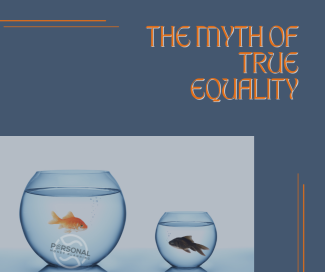
The Myth of True Equality
By Gary Silverman, CFP®
Last week, I explored the reasons society as a whole has trouble being controlled by economic systems such as capitalism and socialism. Today, I’ll share an example of how that comes across when discussing the idea of inequality. Usually, this conversation revolves around the extremes of billionaires and the impoverished. Today, let’s talk about some families we may relate to. Let’s say that Sam owns a business. The business has been around 10 years and the last few years, Sam has finally started earning a pretty good profit. This is good because Sam’s daughter, Jill, has her eyes on an expensive college. Sam can afford to send Jill there, so Jill won’t be burdened with debt once she graduates.
Kim has worked for Sam since the early days. While Kim earns a good salary, it’s not close to what Sam earns from the business. Kim’s son, Sheppard, also has his eyes on an expensive college. But Kim can’t afford to pay the costs for it. Sheppard can still go, but he’ll have some significant debt once he graduates. This is inequality.
Sam could make this equal, right? Sam has a higher income so he could take some of the profits and give Kim a raise. This may mean Sam would not be able to completely pay for Jill’s college. Continuing on this path, things could balance out between Jill and Sheppard so that they each graduated with the same debt. Alternately, they could each choose a less expensive school and graduate debt-free. The important thing is that, financially, they would be equal.
Should Sam do this, or be forced to do so? Remember, Sam has paid a competitive wage. Kim thinks Sam is a great boss. But does that really matter if the inequality exists? Whether or not you think Sam should limit what he provides to his daughter for her education so that Kim’s son Sheppard has an equal start depends on your view on how rewards should be provided.
The capitalist will say that Sam should be encouraged to produce the most. The monetary rewards, including providing for his daughter, is the motivation that creates the most efficient and fair society.
The socialist will say that Sam should evenly divide the spoils of the combined work of the business, if he doesn’t do it naturally, he should be incentivized (forced) to do so. It shouldn’t matter what particular job one has. The equality provided by that will produce the most efficient and most fair society.
In the United States we are of two minds. Whenever we say that one person should be taxed more than another to provide equal benefits, then we are “forcing” the redistribution of wealth. How far to take this is always in discussion—it’s just a bit louder now.
But back to daughter Jill and son Sheppard. Even if Sam raises Kim’s pay so that the kids graduate with the same or non-existent debt burden, they are still not starting equally. Sam can give a job, Jill cannot. Sam is in the same social circles as other business leaders who can help Sheppard start a career. Jill does not have those connections.
So, inequality persists. What do we do about it? As Yoda would say: “Not as easy, it is.” And while I don’t have the answers, I believe it helps us to realize there is never a one-size-fits-all solution.
Gary Silverman, CFP® is the founder of Personal Money Planning, LLC, a Wichita Falls retirement planning and investment management firm and author of Real World Investing.

